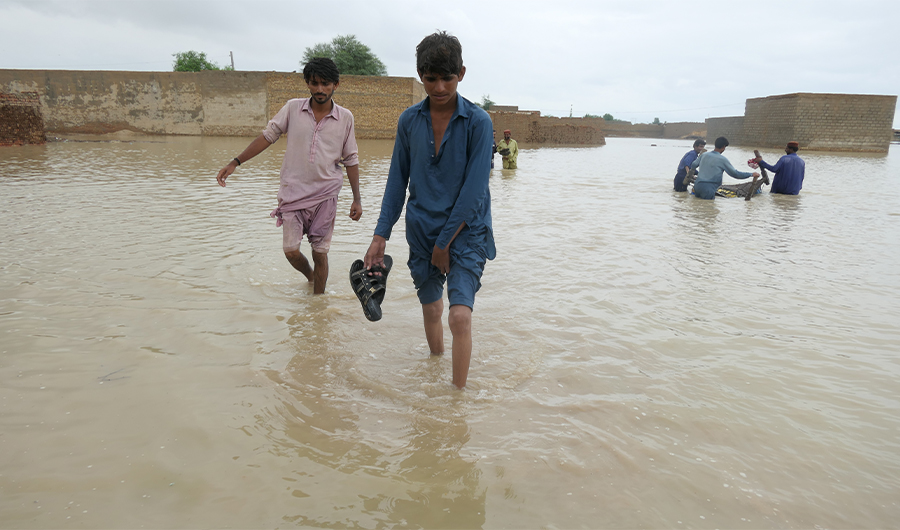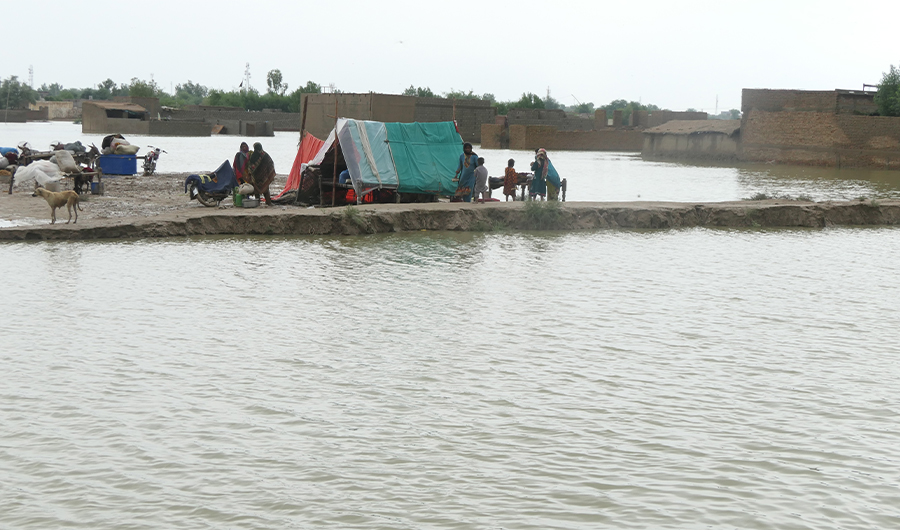KHAPLU/QUETTA: Massive floods, triggered by heavy monsoon rains, on Friday cut off the northern Gilgit-Baltistan (GB) region and the Balochistan province in Pakistan’s southwest from the rest of the country, disrupting travel routes and suspending power and Internet services as well as trade with Afghanistan, Iran and Turkey, officials said.
All 34 districts of Balochistan are currently submerged in water and a key railway bridge that connects Quetta to other parts of Pakistan has collapsed, according to provincial government officials.
“The rail bridge linking Quetta with rest of Pakistan (between Hirok-Dozan stations) has been damaged due to high flash floods leaving train operations suspended,” a railways spokesperson said. “Hope it will be repaired soon.”
Damage to the bridge has also suspended trade with Afghanistan, Iran and Turkey, she added.
In the country’s north, two main highways — the Karakorum Highway (KKH) and the Babusar Road — were blocked after heavy rains triggered landslides at multiple locations, cutting off the Gilgit-Baltistan region from other parts of Pakistan.
“Owing to the falling of stones and floods, KKH is blocked at Mata Bandah, Jijal, Shatan Parri and Kohistan. At the same time, the Babusar Road is also blocked between Naran and Kaghan due to landslides and floods,” Fiaz Ahmed, deputy commissioner of the Diamer district said in a Facebook post.
“The land connects routes between Gilgit-Baltistan and Rawalpindi is completely blocked. Tourists and travelers are requested not to travel till the clearance of roads and improvements of weather.”

People can be seen moving away from flood-hit settlements in Balochistan, Pakistan, on August 25, 2022. (AN Photo)
Salman Sufi, head of the prime minister’s strategic reforms unit, said the Pakistan Telecommunication Authority (PTA) would ensure all cellular companies provide free outgoing call facility to people in flood-affected areas.
“On PM @CMShehbaz directions, @PTAofficialpk will ensure all mobile companies will provide outgoing call facility even with ZERO balance in all flood affected areas,” Sufi said on Twitter.
“This will significantly help reaching emergency services and relief efforts.”
According to the National Disaster Management Authority, the NDMA, 937 people have died across Pakistan during this year’s monsoon season which started in the middle of June. Balochistan is the worst-hit province with at least 230 people killed.
Heavy rains have wreaked havoc in Diamer, Nagar and Ghizer districts of GB, according to Haroon Gul, an assistant director at the GB disaster management authority. At least one man died in Tangir valley of the Diamer district, taking the regional death toll from monsoon rains to 10.
“Nothing could be said as how many houses were fully or partially damaged as it is still raining here,” Gul said. “We are coordinating with district administration and relief goods have also been dispatched for flood victims of Tangir valley.”
Zaheeruddin Babar, a deputy director at GB disaster management authority, told Arab News that monsoon downpours and floods had destroyed more than 50 bridges, 20 power stations and hundreds of homes in GB since July 1.

People near a makeshift camp are surrounded by flood water in Balochistan, Pakistan, on August 25, 2022. (AN Photo)
In Balochistan, officials said, gas and electricity supply was suspended for more than 12 hours while Internet and cellular services remained down due to floods in Quetta and other parts of the province.
“Due to torrential rains & flash #floods in #Balochistan and damage to optical fiber cable, voice and #data services have been impacted in Quetta, Ziarat, Khuzdar, Loralai, Pashin, Chaman, Panjgor, Zhob, Qila Saifullah and Qila Abdullah,” the Pakistan Telecommunications Authority said.
Quetta resident Muhammad Amir, 37, who was traveling in Sibi, said due to the suspension of cell phone services in Quetta, his family was unable to contact him in time and inform him that his father-in-law had passed away.
“I had decided to leave back for Quetta but the traffic on Quetta-Sibi highway is suspended because the Bibi Nani bridge was swept away in floods on Thursday evening,” Muhammad Amir told Arab News.
PTCL, the national telecommunications company in Pakistan, said Internet cables along with a major highway had been damaged due to flooding, suspending services in Quetta and many cities of Balochistan.
Over 30 million people in Pakistan have been rendered homeless by this year’s monsoon rains, with the country’s climate change minister on Thursday calling the situation a “climate-induced humanitarian disaster of epic proportions.”
















